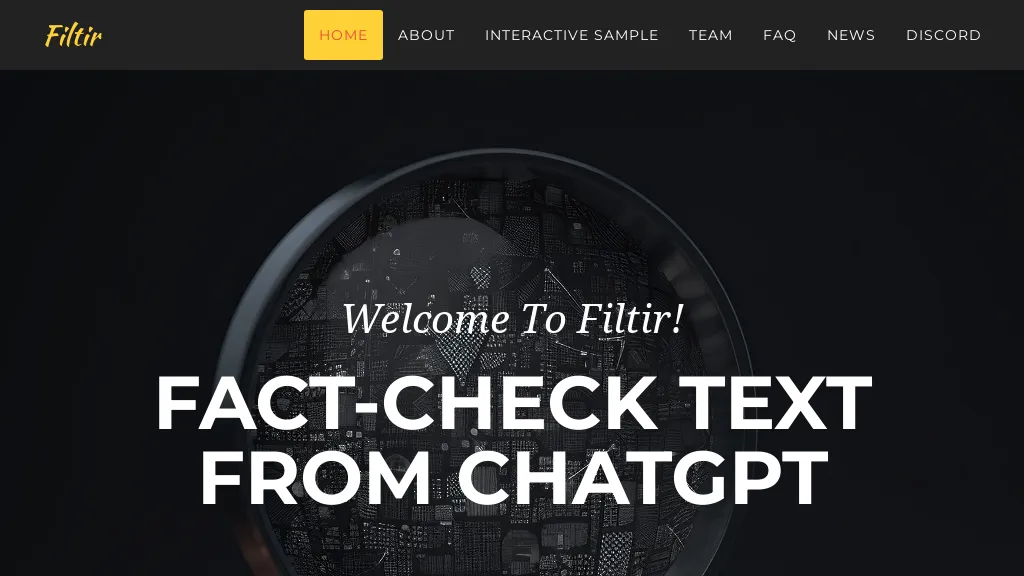What is Filtir?
Filtir is a state-of-the-art AI platform that is supposed to help content creators with its fact-checking chat plugin. It laboriously checks written content against the existence of public and auditable evidence of any claim being made. If the claims are not substantial, Filtir notifies the user straight away. It further allows the viewing of interactive sample results where sources and the factual grounding of each fact-checking result can be seen. Basically, Filtir aims to support factual claims in the text with evidence, without ruling on their veracity, reaching out to trusted sources, and always refining its approach in cooperation with users. Most importantly, Filtir treats user privacy as paramount-no data sold or shared with third-party services for marketing purposes.
Filtir’s Key Features & Benefits
Fact-checking: It verifies the truth value of the claims in the written content.
Checking of the Written Body Text: Scans the full text body to verify the completeness of fact-checking.
Auditable Evidence Support: Sources of evidence are transparent and traceable.
Alert to User: Warns the user if claims are not supported by sufficient evidence.
Interactive Sample Results: User engagement – understand through sources and facts behind every result.
Aggregated, these make Filtir a golden tool for content developers who ensure accuracy and credibility of their work. Unique selling proposition: ease of use, strong privacy, continuous improvement possible thanks to users’ collaboration.
Use Cases and Applications for Filtir
Filtir can also be quite versatile, serving a wide gamut of use cases that include:
- Written Content Claim Check: Assures accuracy and credibility in written content.
- Fact-checking for content authors: This saves the authors from losing face in any of their work.
- Evidence to support claims within a text: It gives good evidence to prove the claim that would have been made in the text.
- Verification of AI-generated text for accuracy: Verifies that AI-generated content is appropriate and true.
Filtir is especially helpful in journalism, academia, and other fields that rely on fact-checking. Most importantly, it has proved to be a goldmine among content creators.
How to Use Filtir
Using Filtir is pretty easy to operate. To get you started, here is a simplified process:
- Install the Plugin: The very first thing you do is download the Filtir chat plugin onto your platform of choice.
- Insert the text you want to fact-check into the plugin’s interface.
- Run the Fact-check: Trigger the fact-checking. Filtir will scan the text for its claims and evaluate them.
- Analyze Results: Go through the dynamic sample results that will be displayed by Filtir. This includes going through sources and evidence for every claim.
- Act on Alerts: Where Filtir identifies claims that have low evidence, peruse them and make necessary edits.
For best practices, your text should be clear and specific for fact-checking. Please take time to familiarize yourself with the user interface to explore all features provided.
How Filtir Works
Filtir uses the latest in AI technology to fulfill its fact-checking functions. It runs advanced algorithms and models for parsing through written text to identify claims and cross-referencing them against a large database of trusted sources. This involves the following:
- Text Analysis: Filtir scans the text to identify potential claims that need verification.
- Source Matching: Then, the tool will match the claims against its database of reliable sources for supporting evidence.
- Compiling Results: Filtir compiles the results by flagging those claims which have supporting evidence and flagging the ones that do not.
- User Notification: The user is notified about claims that are not supported by enough evidence and interactive sample results to review.
Pros and Cons of Filtir
Here are the pros and cons of using Filtir:
Pros
- Accurate: Has guaranteed fact-checking of statements for increasing the credibility of content.
- User-Friendly: Very easy to download and use, the interface is friendly enough.
- Privacy: It does not sell user data or share it with any third-party applications or persons.
Cons
- Dependent on Sources: It is dependent on the quality of sources in its database for its fact-checking accuracy.
- Not an Arbiter of Truth: While Filtir can support a claim by including evidence, it cannot actually arbitrate the truth.
User feedback tends to point out that with Filtir, the substance of written copy is normally more reliable, yet some users would like more variety in the source materials.
Conclusion about Filtir
Filtir is a powerful AI tool intended for fact-checking; as such, it provides content authors with a sure way of claiming and keeping the integrity of their content. Its ease of use, strong privacy policy, and continuous improvement through collaborative feedback place it as one of the best in the market. In times to come, its capabilities are most likely refined further, given which its value would scale up because it’s a critical tool needed for maintaining factual accuracy in written content.
Filtir FAQs
Frequently Asked Questions
Q: Does Filtir sell or share my data?
A: No, Filtir doesn’t sell or share data with third parties for marketing purposes because it respects user privacy.
Q: Does Filtir find out what is absolutely true and correct of a claim?
A: No, Filtir supports a claim by evidence, yet it does not arbitrate over the truth.
Q: How good is fact-checking on Filtir?
A: Filtir’s fact-checking accuracy is quite high, assuming good quality from its database-feeding sources.
Q: What kind of users does Filtir help?
A: Content authors, journalists, and any professionals requiring factual accuracy in their written content benefit from Filtir.
Q: Is Filtir easy to use?
A: Yes, Filtir is designed in a way that makes it user-friendly with an intuitive interface, hence accessible to use by all users.










